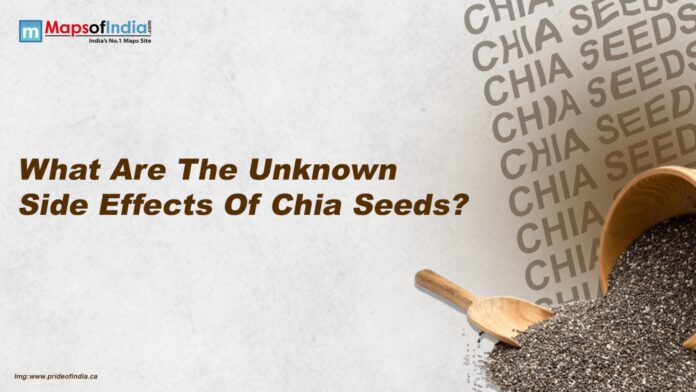Chia seeds have become quite popular recently because of their notable nutritional benefits. These small seeds are rich in fibre, omega-3 fatty acids, and antioxidants, which have led to them being labelled as a superfood. Many people have started drinking chia seed water, simply water infused with chia seeds, to take advantage of its health benefits. However, it’s crucial to be aware of potential side effects that might arise, mainly if chia seeds are consumed excessively or if you have specific sensitivities.
What Are Chia Seeds and Chia Seed Water?
Before delving into the possible side effects, it’s helpful to understand what chia seeds and chia seed water are. Chia seeds come from a plant known as Salvia hispanica. These tiny seeds are packed with nutrients and can absorb a substantial amount of water. When mixed with water, chia seeds expand and form a gel-like substance. Chia seed water is simply water that has been infused with these seeds, allowing the seeds to release their beneficial nutrients into the liquid.
Potential Side Effects of Chia Seed Water
Although chia seeds are generally safe for most people, consuming them in large amounts or if you have specific sensitivities can lead to various side effects. It’s important to be aware of these potential issues to make informed choices about your diet.
Digestive Issues
- Bloating and Gas: Chia seeds are exceptionally high in fibre. While fibre is known to support good digestive health, too much fibre too quickly can lead to digestive discomfort. This often includes bloating and gas. Your digestive system needs time to adjust to significant increases in fibre, so it’s essential to introduce chia seeds gradually into your diet.
- Constipation: Fibre is typically beneficial for preventing constipation. However, consuming excessive fibre can sometimes have the opposite effect. If you are prone to constipation, eating a large quantity of chia seeds might exacerbate the problem rather than alleviate it.
- Diarrhoea: Excessive consumption of chia seeds can occasionally result in diarrhoea. This is particularly likely if you are not used to a high-fibre diet. When introducing chia seeds into your diet, it is wise to start with small amounts and gradually increase them to allow your digestive system to adapt.
Interactions with Medications
Chia seeds can interact with certain medications. If you are currently taking any medications, especially blood thinners or diabetes medications, it is essential to discuss with your healthcare provider before adding chia seeds to your diet. Chia seeds can affect the absorption and effectiveness of these medications, potentially leading to unintended consequences. Your doctor can provide personalised advice to ensure that chia seeds do not affect your treatment.
Allergic Reactions
While rare, some individuals may experience allergies to chia seeds. Symptoms of a chia seed allergy can include skin rashes, itching, swelling, difficulty breathing, and digestive issues. If you notice any of these symptoms after consuming chia seeds, it is important to seek medical attention immediately. Allergic reactions can vary in severity, and prompt treatment is necessary to prevent complications.
Choking Hazard
Dry chia seeds pose a choking risk if they are not appropriately prepared. It is crucial to consume chia seeds only after they have been soaked in water or mixed with other liquids. When chia seeds are dry, they can absorb moisture from the mouth and throat, potentially leading to choking. You can significantly reduce this risk by ensuring that chia seeds are adequately hydrated before consumption.
How Much Chia Seed Water is Safe?
There is no universally agreed-upon daily amount of chia seeds that is recommended. However, it is generally advisable to start with a small quantity and gradually increase your intake as your body becomes accustomed to it. This approach helps minimise the risk of experiencing any negative effects of chia seeds. It’s also important to consider how your body reacts and adjust your consumption accordingly. Reducing your intake might be necessary if you experience any discomfort or adverse effects.
Tips for Safe Chia Seed Consumption
- Start Slowly: If you are new to chia seeds, begin with a small amount and gradually increase your intake over time. This allows your digestive system to adjust to the added fibre without causing undue stress or discomfort.
- Hydration: When consuming chia seed water, ensure you drink plenty of additional water throughout the day. Chia seeds absorb a lot of water, and staying hydrated helps to prevent constipation and supports overall digestive health.
- Consult Your Doctor: Before incorporating chia seeds into your diet, it is wise to consult your healthcare provider if you have any underlying health conditions or are taking medications. Your doctor can offer tailored advice based on your health needs and potential medication interactions.
- Choose Quality Products: Select chia seeds from reputable sources to ensure their quality and purity. High-quality chia seeds are more likely to offer the health benefits you seek and are less likely to cause adverse effects. Avoid purchasing chia seeds from unknown or questionable sources, as their quality may not be guaranteed.
Chia seeds offer numerous health benefits when consumed in moderation. They are a rich source of fibre, omega-3 fatty acids, and antioxidants, making them a valuable addition to a balanced diet. However, it is crucial to be aware of potential side effects and to consume chia seeds responsibly. By starting with small amounts, staying hydrated, and paying attention to how your body responds, you can enjoy the benefits of chia seeds while minimising the risk of adverse effects. If you have any concerns or underlying health conditions, consulting with your healthcare provider can help ensure that chia seeds are a safe and beneficial part of your diet.




